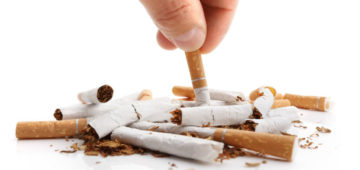RSPH is calling for public confusion over nicotine to be addressed as a way of encouraging smokers to use safer forms of the substance. Tobacco contains nicotine along with many other chemicals, but nicotine by itself is fairly harmless.
Nicotine is harmful in cigarettes largely because it is combined with other damaging chemicals such as tar and arsenic, and as a highly addictive substance getting hooked on nicotine is one of the prime reasons why people become dependent on cigarettes. Electronic cigarettes and Nicotine Replacement Therapy (gum, lozenges, and patches) contain nicotine but don’t contain the harmful substances found in cigarettes.
Alarmingly RSPH research reveals that 90% of the public still regard nicotine itself as harmful and the organisation is now calling for measures to promote safer forms of nicotine products to smokers and make it harder to use tobacco. Among the measures which are being called for in its report: Stopping smoking by using other sources of nicotine:
- Introduction of a smoking exclusion zone around pubs, bars and schools – allowing use of e-cigarettes but not allowing cigarette smoking. If smoking was banned from outside pubs and bars 50% of adults would be more likely to use these areas, and roughly one third of smokers would be more likely to use alternatives to cigarettes such as e-cigarettes or NRT;
- Greater utilisation of e-cigarettes by smoking cessation services; only 3 out of 134 stores selling tobacco also sold NRT products;
- Mandatory sale of Nicotine Replacement Therapy in shops selling cigarettes. In one study fewer than 0.5% of retailers sold Nicotine Replacement Therapy; almost three quarters of the public (70%) support mandatory sales of such products;
- Licensing of all purveyors of cigarettes so that Local Authorities can remove the license of any retailers found not to be acting in accordance with tobacco legislation, such as age restrictions and the display ban;
- Renaming e-cigarettes nicotine sticks or vapourisers to distance them from cigarettes
Shirley Cramer CBE, Chief Executive of RSPH, said: “Over 100,000 people die from smoking-related disease every year in the UK. While we have made good progress to reduce smoking rates, 1 in 5 of us still does. Most people smoke through habit and to get their nicotine hit. Clearly we would rather people didn’t smoke, but in line with NICE guidance on reducing the harm from tobacco, using safer forms of nicotine such as NRT and e-cigarettes are effective in helping people quit.



